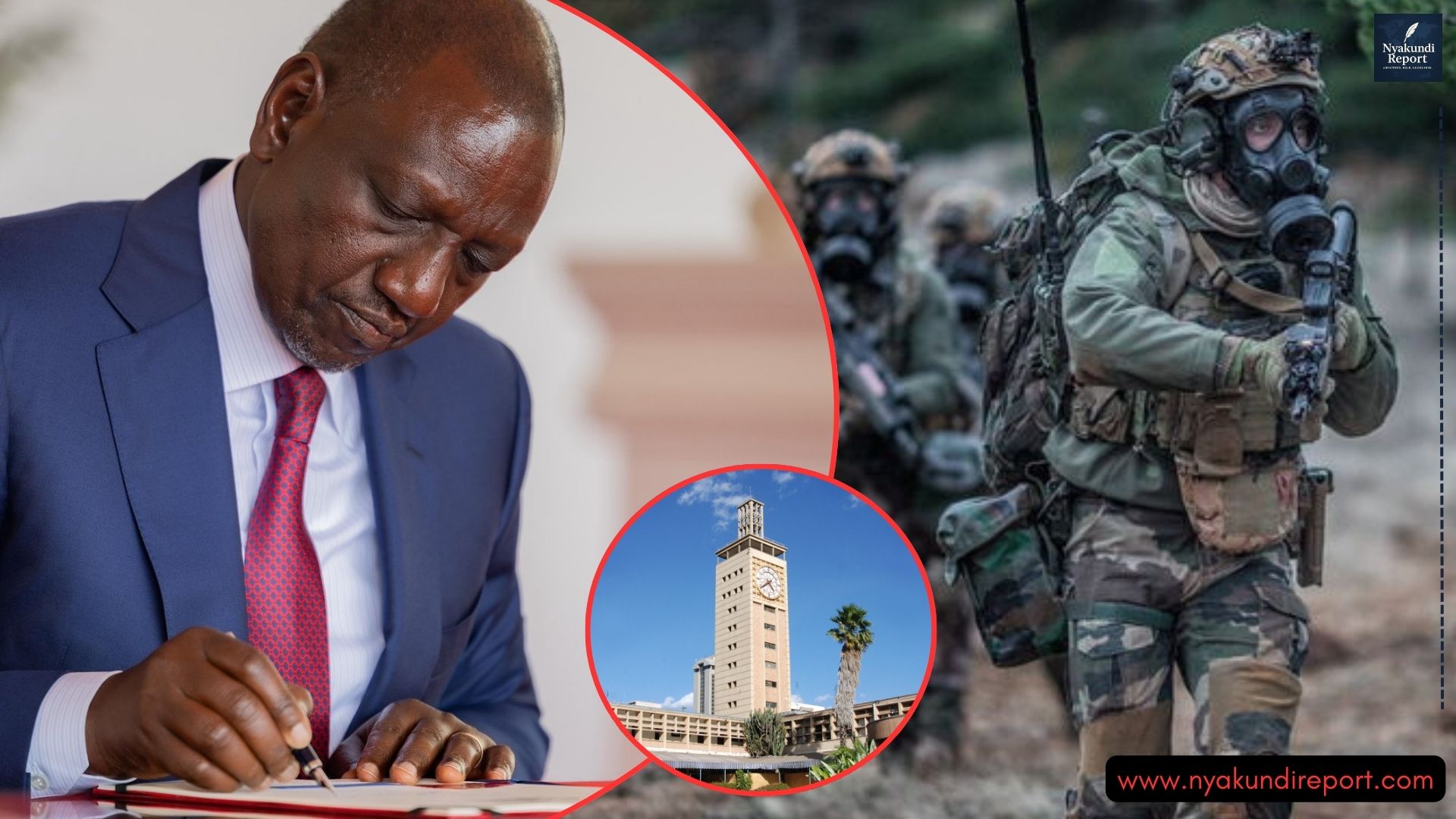A protracted crisis within the Human Resource department at the Nairobi Women’s Hospital has reportedly plunged staff into months of salary arrears, financial uncertainty, and systemic exploitation, with locum employees experiencing progressively delayed payments that have stretched from weekly disbursements to monthly, creating an environment where remuneration is unpredictable and trust in management is deeply eroded.
This financial instability has left employees struggling to meet their basic obligations, with some reporting that their entire household budgets have been disrupted as they wait for payments that arrive inconsistently or partially, forcing many to rely on informal borrowing or defer critical expenses.
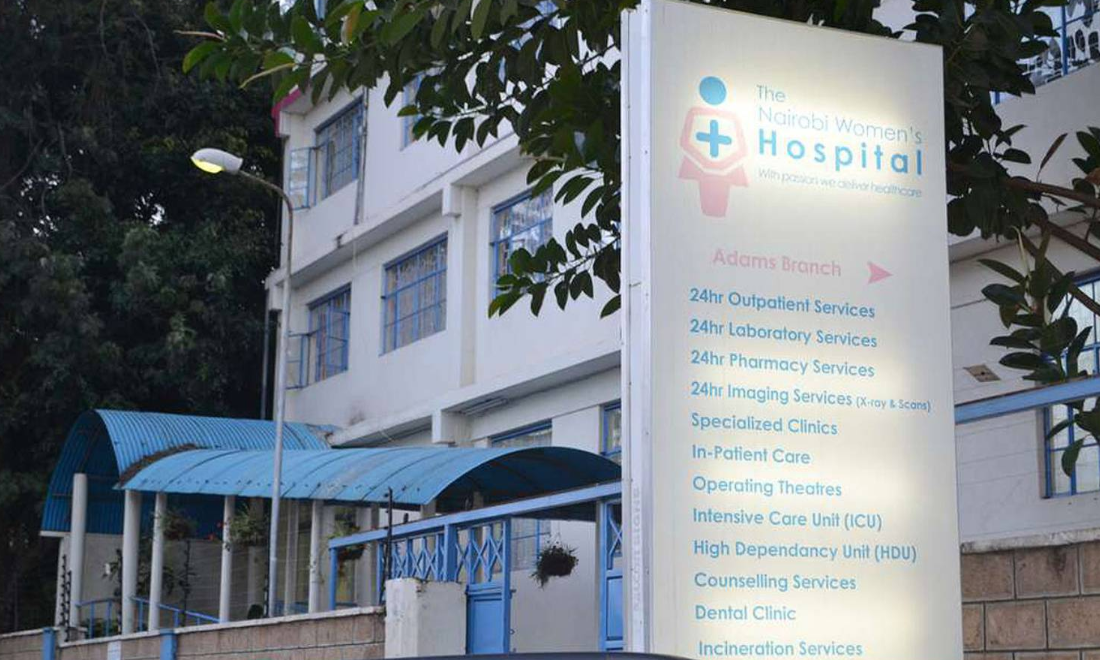
Beyond the challenges of payroll, staff report that contributions to the hospital’s staff SACCO have been mismanaged, with funds either unaccounted for or disappearing entirely from records, leaving employees questioning the integrity of systems designed to safeguard their savings.
Resignations and contract conclusions are reportedly delayed for months, creating a situation where employees cannot exit the institution without enduring bureaucratic obstacles and administrative frustration.
Many staff describe feeling trapped, their professional mobility hindered while internal processes appear deliberately slow, further eroding morale and undermining confidence in the leadership of the hospital’s HR operations.
Operational challenges extend into clinical departments, where staffing pressures have been exacerbated by the deployment of unlicensed personnel in critical areas such as laboratories, pharmacies, high-dependency units, and theatres.
Consultants have reportedly reduced their presence or withdrawn entirely, contributing to gaps in care delivery and placing patients at higher risk, while experienced personnel are left to compensate for inadequacies in staffing and supervision.
The combination of payroll inconsistencies, mismanagement of SACCO funds, and questionable staffing practices has contributed to heightened tension within the hospital, with staff citing personal hardship, emotional stress, and declining workplace satisfaction.
Attempts to escalate grievances through phone calls, emails, or direct engagement with the Group HR have reportedly been met with silence or deflection, leaving employees without recourse and amplifying a sense of abandonment.
The persistent failure of HR to respond to inquiries, address complaints, or rectify delayed payments has contributed to a broader perception that institutional governance is ineffective, placing both staff welfare and the quality of patient care under strain.
The resulting environment has not only affected current employees but has also deterred potential recruits, as reports of administrative dysfunction, inconsistent pay, and unsafe operational practices circulate within professional networks.
Staff members have called on the hospital’s founders and governing stakeholders to investigate these issues thoroughly, audit financial procedures, review internal operations, and implement robust systems to restore accountability and confidence, while assuring both employees and patients that care standards are not being compromised.
With employee grievances left unresolved and financial management under scrutiny, the crisis within the Human Resource department at the Nairobi Women’s Hospital presents a complex challenge that intertwines staff welfare, financial transparency, and patient safety, making urgent intervention by leadership critical to prevent further deterioration of working conditions and operational integrity.
“Hi Nyakundi. Thank you for always standing up for the oppressed. I feel I need to tell someone what is really happening here at the Nairobi Women’s Hospital because it has gone on for too long and no one is listening. The Human Resource department has completely failed the staff. People are owed months of salaries and locum employees, who used to get paid weekly, are now waiting a full month for their pay, and sometimes they don’t even get the full amount. It’s chaos. Staff can’t plan their lives, they borrow money, they delay bills, everything is disrupted. It doesn’t stop there. Contributions to the staff SACCO have vanished, and nobody knows where the money went. Resignations are deliberately delayed and contract processes are blocked. People want to leave but they’re trapped in a system that seems designed to frustrate them. Women, especially married ones, are treated unfairly under the assumption that their husbands will take care of them, which is humiliating and completely wrong. Staff who speak up are ignored, threatened, or sidelined, and labor offices are now flooded with complaints that come directly from this abuse. Even patient care is suffering. Unlicensed staff are being placed in critical areas like labs, pharmacies, HDU, and theatres. Some consultants have left completely. Experienced staff are struggling to cover gaps, and patients are being put at real risk. The Group HR refuses to respond to calls, emails, or any attempts to raise grievances. People are suffering personally as well. Marriages breaking down, loved ones lost, financial stress everywhere. There is corruption too. The same HR head runs the SACCO and money disappears without explanation. Payroll has been manipulated, and I have seen contracts and procurement schemes that benefit insiders while staff suffer. We are talking about millions going missing in ways that no one is accountable for. This place is not a hospital anymore in the way it should be. Staff are treated like they are disposable, their livelihoods ignored, and the work environment has become toxic. Patients are at risk, and everyone who comes here hoping for care is affected. People are afraid to speak, but things need to be known. Please, Nyakundi, I needed to tell someone who I know will listen and not just turn away. This is more than an HR problem. It’s a human crisis. Staff cannot survive like this, and neither can the patients who depend on the hospital,” a source within the facility wrote to us.
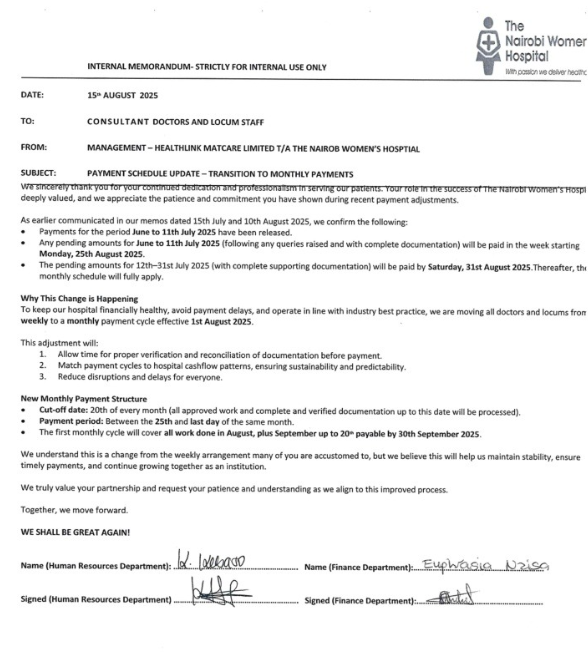
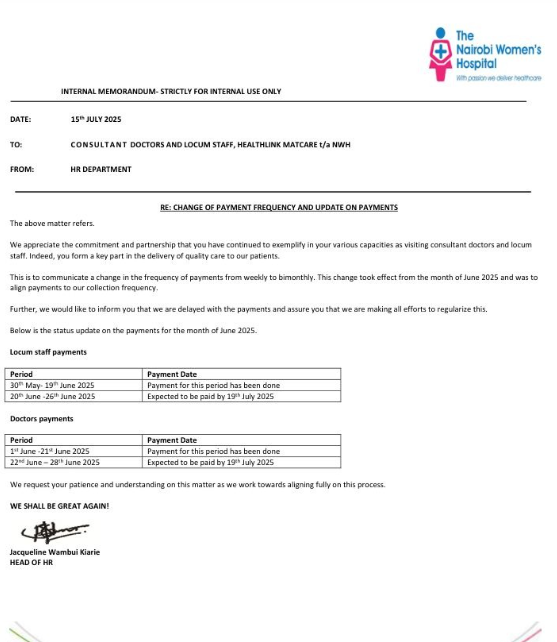
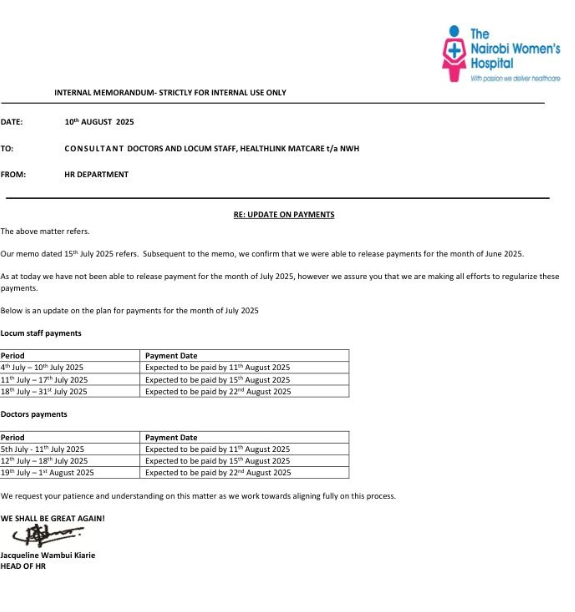
It remains to be seen why agencies tasked with oversight of healthcare institutions have not intervened in the ongoing crisis at the Nairobi Women’s Hospital, as the Human Resource department continues to plunge staff into months of salary arrears, financial instability, and exploitation.
The Ministry of Health, the Kenya Medical Practitioners and Dentists Council, and the Public Service Commission have all failed to intervene as payroll mismanagement persists, unlicensed staff operate in critical hospital departments, and resignations and contract processes remain obstructed, leaving employees trapped in a system rife with negligence and operational failures.
Labor authorities such as the Ministry of Labour and Social Protection must step in to probe the persistent delays in salary payments, discrepancies in SACCO contributions, and the erosion of staff rights, while parliamentary committees on health and public service should conduct urgent audits and demand accountability from hospital management to protect both employees and patients.
Are you a current or former employee of the Nairobi Women’s Hospital who has experienced delayed salaries, withheld payments, or observed irregularities within the Human Resource department? Have you encountered obstacles in processing contracts or resignations, or witnessed unsafe staffing patterns in critical areas such as laboratories, pharmacies, theatres, or high-dependency units?
We are inviting staff members to share their experiences so the full scope of these challenges can be understood.
If you have information about staff treatment, financial irregularities, or operational weaknesses at the Nairobi Women’s Hospital, please contact us through our verified platforms.
We will continue to follow this story closely, providing updates as new information emerges and as responses from oversight bodies, hospital management, and staff become available, ensuring that the public remains informed about the ongoing crisis at the Nairobi Women’s Hospital.



